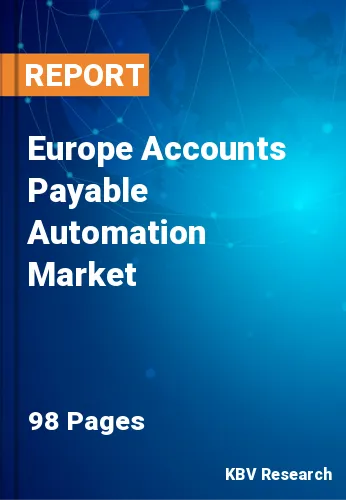The Europe Accounts Payable Automation Market would witness market growth of 10.6% CAGR during the forecast period (2022-2028).
The expenditure account for the product or service paid for with credit often receives the debit offset for this transaction. If the item bought was a capitalizable asset, the debit might also be made to an asset account. The accountant debits the account payable once the bill is paid to reduce liability. The cash account is given the offset credit, which reduces the cash balance.
Managing a business's monetary responsibilities to its creditors and suppliers is done via the accounts payable procedure. The accounts payable process has four major processes from beginning to end. Generally, invoice capture manually enters invoice data into a system of records, including vendor information, line items, amounts, and GL code. Risks related to accuracy and human error exist in this.
Approval of invoices entails reviewing and approving supplier invoices. To get the required permissions, an AP team member would often physically walk the paper invoice around the office. This occurs before a cost is entered into the ERP and a payment is sent. After an invoice is prepared for payment, the business must get authorization before sending the money. This information comprises the due date, the manner of payment, and the payment amount.
The market for accounts payable automation in Europe is expanding quickly due to cloud services, ML, and AL. Corporations are releasing new software to capture a larger market share. Also, forward-thinking, digitally savvy institutions are already debating API strategy 2.0. API strategy 2.0 scales with consistency and uniformity from 10–100 public APIs to 1000s of bundle-ready building blocks (reusable business and IT capabilities described as APIs and Services). Large banks are also expanding this portfolio of APIs and services to maximize the use of hard-to-find talent, expand the usage of APIs and services within digital teams, and reveal existing capabilities. One of the key factors driving market growth in the Europe region is the need for restricted user access to decrease payment fraud.
The Germany market dominated the Europe Accounts Payable Automation Market by Country in 2021, and would continue to be a dominant market till 2028; thereby, achieving a market value of $345.2 million by 2028. The UK market is anticipated to grow at a CAGR of 9.7% during (2022 - 2028). Additionally, The France market would exhibit a CAGR of 11.5% during (2022 - 2028).
Based on Component, the market is segmented into Solution and Services. Based on Deployment Mode, the market is segmented into On-Premise and Cloud. Based on Organization Size, the market is segmented into Large Enterprises and SMEs. Based on Vertical, the market is segmented into BFSI, IT & Telecom, Government, Manufacturing, Healthcare & Lifesciences, Consumer Goods & Retail and Others. Based on countries, the market is segmented into Germany, UK, France, Russia, Spain, Italy, and Rest of Europe.
Free Valuable Insights: The Worldwide Accounts Payable Automation Market is Projected to reach USD 5.3 Billion by 2028, at a CAGR of 11.3%
The market research report covers the analysis of key stake holders of the market. Key companies profiled in the report include SAP SE, Fidelity National Information Services, Inc., The Sage Group PLC, Comarch SA, Tipalti, Inc., Bottomline Technologies, Inc., AvidXchange Holdings, Inc., Procurify Technologies, Inc., FinancialForce.com, Inc. and Zycus, Inc.
By Component
By Deployment Mode
By Organization Size
By Vertical
By Country
Our team of dedicated experts can provide you with attractive expansion opportunities for your business.

